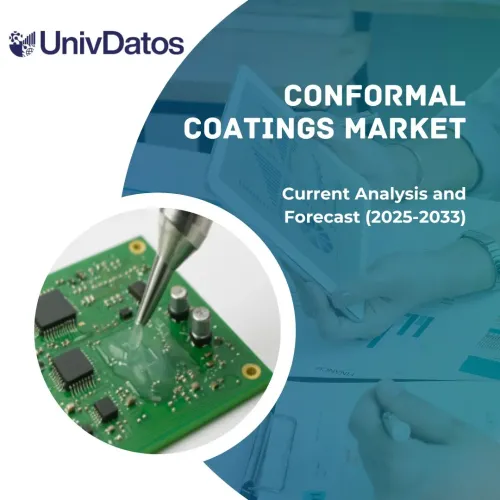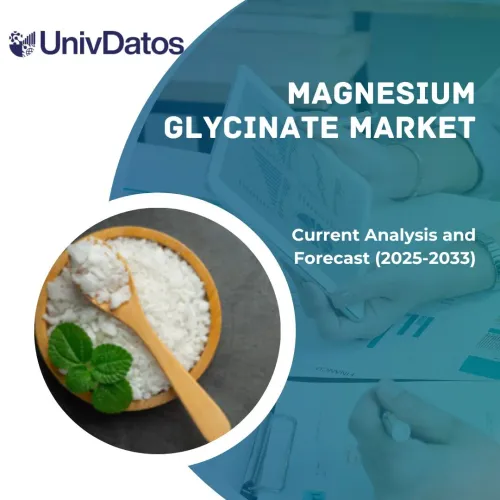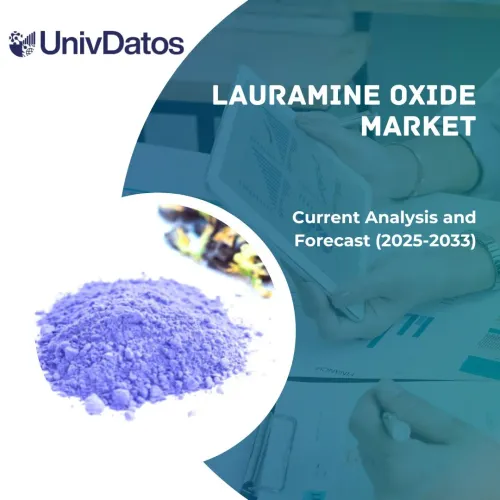- Home
- About Us
- Industry
- Services
- Reading
- Contact Us
Hydrogen Electrolyzer Market: Current Analysis and Forecast (2024-2032)
Emphasis on Product (Alkaline Electrolyzer, PEM Electrolyzer, Solid Oxide Electrolyzer); Capacity (≤ 500 kW, > 500 kW – 2 MW, Above 2 MW) Application (Power Generation, Transportation, Industry Energy, Industry Feedstock, Building Heating & Power and Others); Region/Country
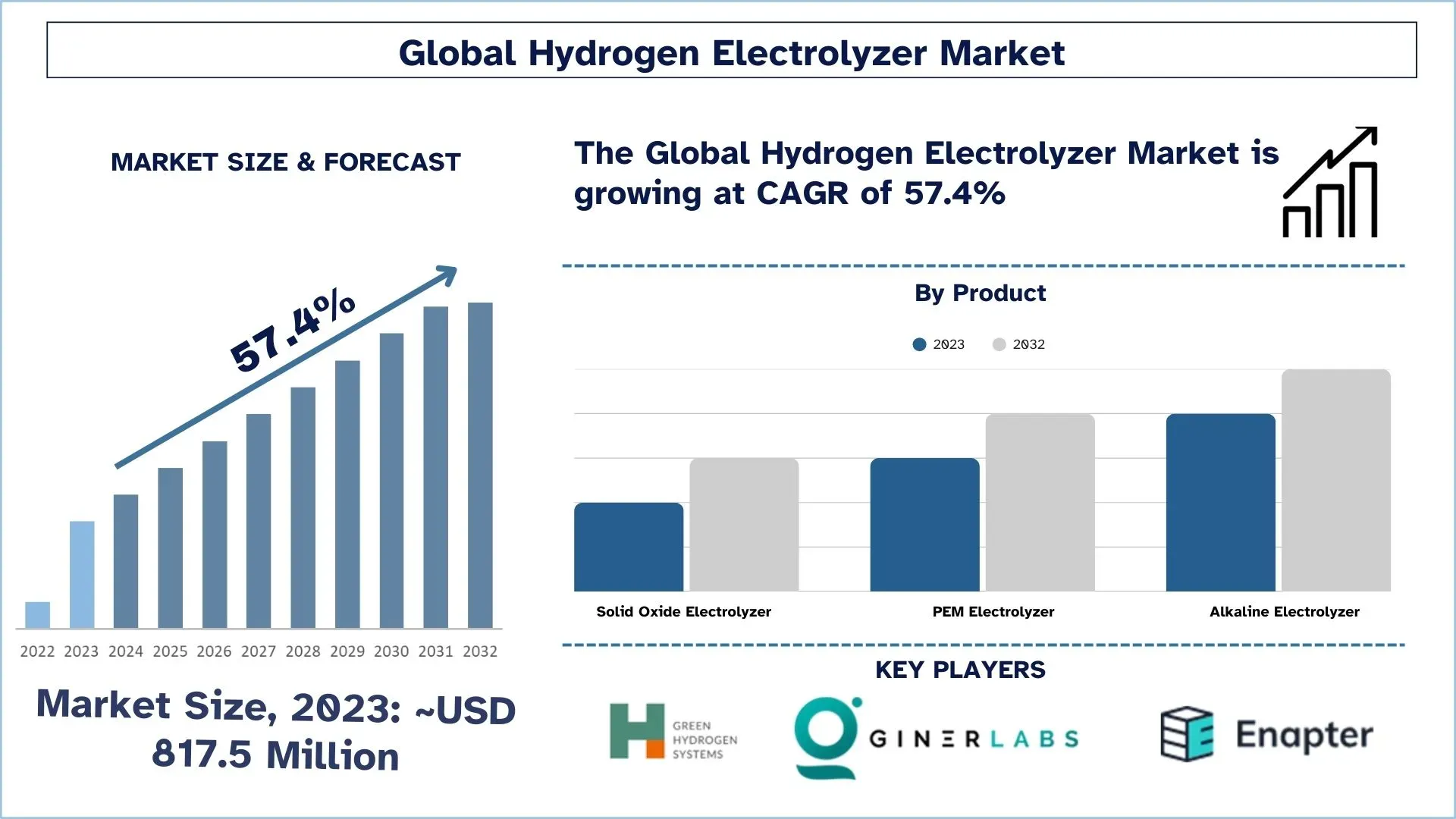
Hydrogen Electrolyzer Market Size & Forecast
The Hydrogen Electrolyzer Market was valued at USD 817.5 million and is expected to grow at a strong CAGR of around 57.4% during the forecast period (2024-2032), owing to investment in green hydrogen production.
Hydrogen Electrolyzer Market Analysis
Global hydrogen electrolyzer market expansion occurs quickly because green hydrogen serves as a crucial element for worldwide energy transition advancement. Public and private actors across the world dedicate heavy financial resources to electrolyzer technology development for sector decarbonization in transportation and power generation operations, and industrial applications. The hydrogen electrolyzer market is expanding rapidly because of technological improvements coupled with lower prices and supportive policies that integrate carbon taxes along with renewable energy incentives. Major economic entities like the EU, along with China and the USA, lead numerous large-scale green hydrogen initiatives through their work on proton exchange membrane (PEM), alkaline, and solid oxide electrolyzer systems in the competitive market.
Hydrogen Electrolyzer Market Trends
This section discusses the key market trends that are influencing the various segments of the Hydrogen Electrolyzer Market as identified by our team of research experts.
Increasing Adoption of Gigawatt-Scale Green Hydrogen Projects
The hydrogen electrolyzer market has experienced an explosive growth of global-scale green hydrogen projects over the last few years. Governments, together with private companies, dedicate their resources toward constructing massive hydrogen production units to fulfill rising requirements for clean energy throughout industrial operations and transportation, and power systems. Detachments of large electrolyzer systems are installed by the U.S. alongside Germany and China, and Australia, as they generate green hydrogen from renewable wind and solar energy while maintaining cost-efficient production levels. The development of massive-scale ventures seeks to establish economies of scale in addition to minimizing hydrogen manufacturing expenses thereby accelerating worldwide decarbonization initiatives so green hydrogen will emerge as a dominant energy carrier in future years.
Hydrogen Electrolyzer Industry Segmentation
This section provides an analysis of the key trends in each segment of the global Hydrogen Electrolyzer market report, along with forecasts at the global, regional, and country levels for 2024-2032
The Alkaline Electrolyzer Market Dominates the Hydrogen Electrolyzer Market
Based on product, the market is segmented into alkaline electrolyzer, PEM electrolyzer, and solid oxide electrolyzer. The alkaline electrolyzer market segment held the dominant share of the market in 2023 because it combines low operating costs with long equipment durability and enables efficient, large-scale production of pure hydrogen. Industrial and large-scale facilities utilize alkaline electrolyzers as their mature technology matches well with lower capital expenditures when compared to proton exchange membrane (PEM) electrolyzers. The suitability of alkaline electrolyzers with renewable energy resources helps produce green hydrogen for worldwide decarbonization initiatives. The growing government support and investments in hydrogen infrastructure create an upward trend in alkaline electrolyzer demands, which stimulates the advancement of clean energy solutions.
The Power Generation Market Dominates the Hydrogen Electrolyzer Market
By application, the market is segmented into power generation, transportation, industrial energy, industry feedstock, building heating & power, and others. The power generation market held the dominant share of the market because industries, together with utilities, need renewable alternatives over conventional fossil fuels. The electrolytic production of hydrogen gains popularity for grid stability functions as well as renewable energy management applications and extended power backup systems. The conversion of solar and wind power electricity into hydrogen through electrolyzers produces efficient storage and distribution capabilities, which eliminates grid congestion while supplying stable power. Industrial operations, together with power plants, use hydrogen-powered fuel cells and gas turbines to effectively decarbonize their operations. The power generation segment leads the growing demand for hydrogen electrolyzers during the global energy transition by supporting the development of a low-carbon economy.
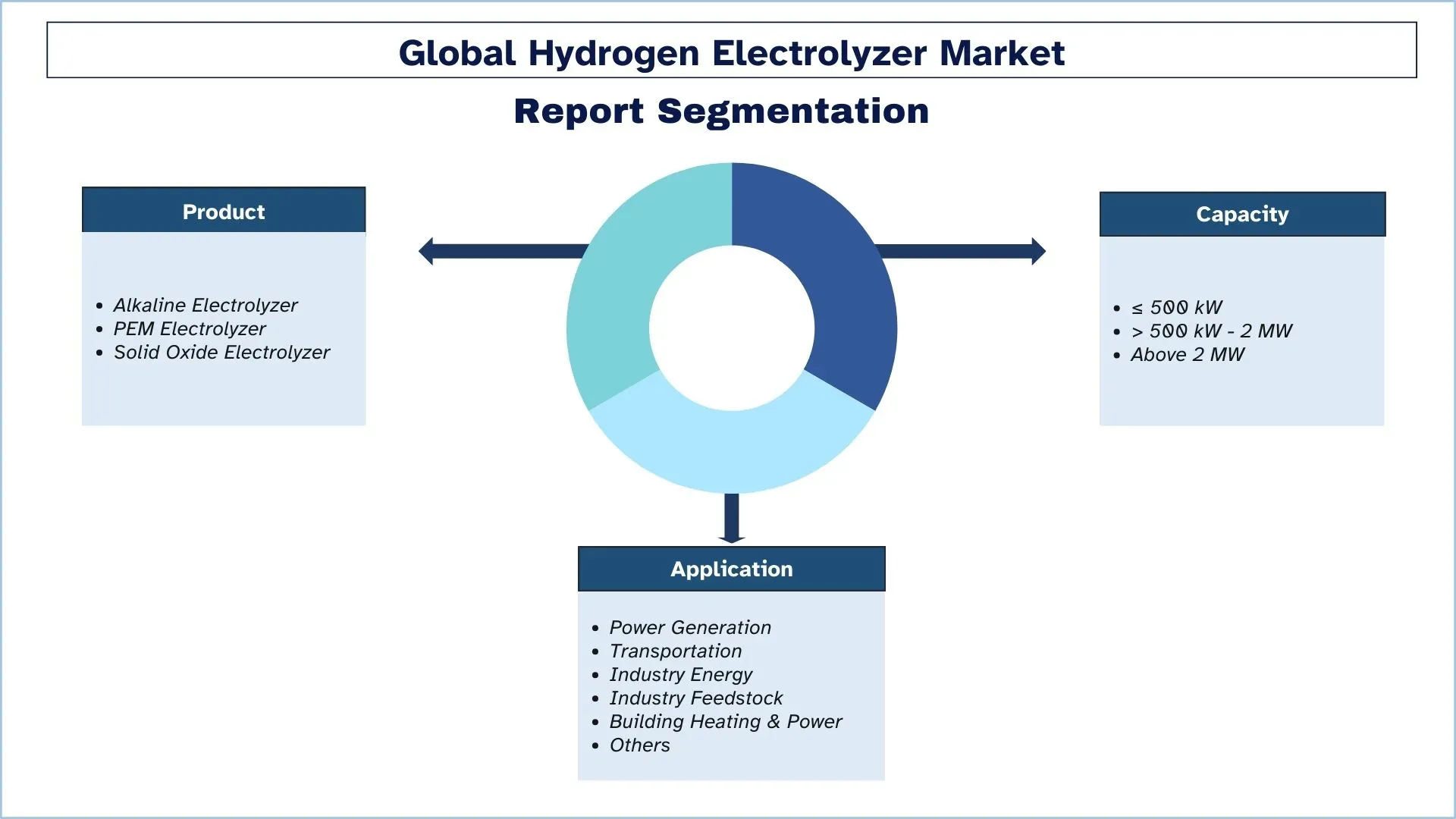
North America is Expected to Grow with a Significant CAGR During the Forecast Period
Government action, coupled with corporate funding together with increased industrial use of clean hydrogen, causes the North American hydrogen electrolyzer market to experience exponential growth. The United States, together with Canada, serves as a leader in hydrogen roadmapping along with their funding programs and tax benefits that include the U.S. Inflation Reduction Act and Canada's Hydrogen Strategy. Green hydrogen production facilities at considerable scales benefit from the combination of public-private sector partnerships while receiving support through the abundant renewable resources of solar and wind power. The market growth prediction benefits from increasing market demand for hydrogen-based mobile systems and fuel cell equipment.
The U.S. Dominates the North American Hydrogen Electrolyzer Market
Federal and state-level policies push the U.S. hydrogen electrolyzer market into rapid growth on its way toward clean energy and carbon neutrality. The Hydrogen Shot initiative, led by the Department of Energy, works toward making green hydrogen accessible for $1 per kilogram to drive electrolyzer industry growth through enhanced investment. The Bipartisan Infrastructure Law, together with the Inflation Reduction Act, provides funding for hydrogen infrastructure, which supports electrolyzer installations in different industries. Multiple essential projects throughout California and Texas, and in the Midwest region, work to merge hydrogen technology with renewable power sources and strengthen power grids, and reduce carbon emissions in heavy industries. Approximately 50 million metric tons of hydrogen production per year through electrolysis will establish the United States as a top contributor to global electrolyzer deployment, thanks to corporate partnerships with public organizations.
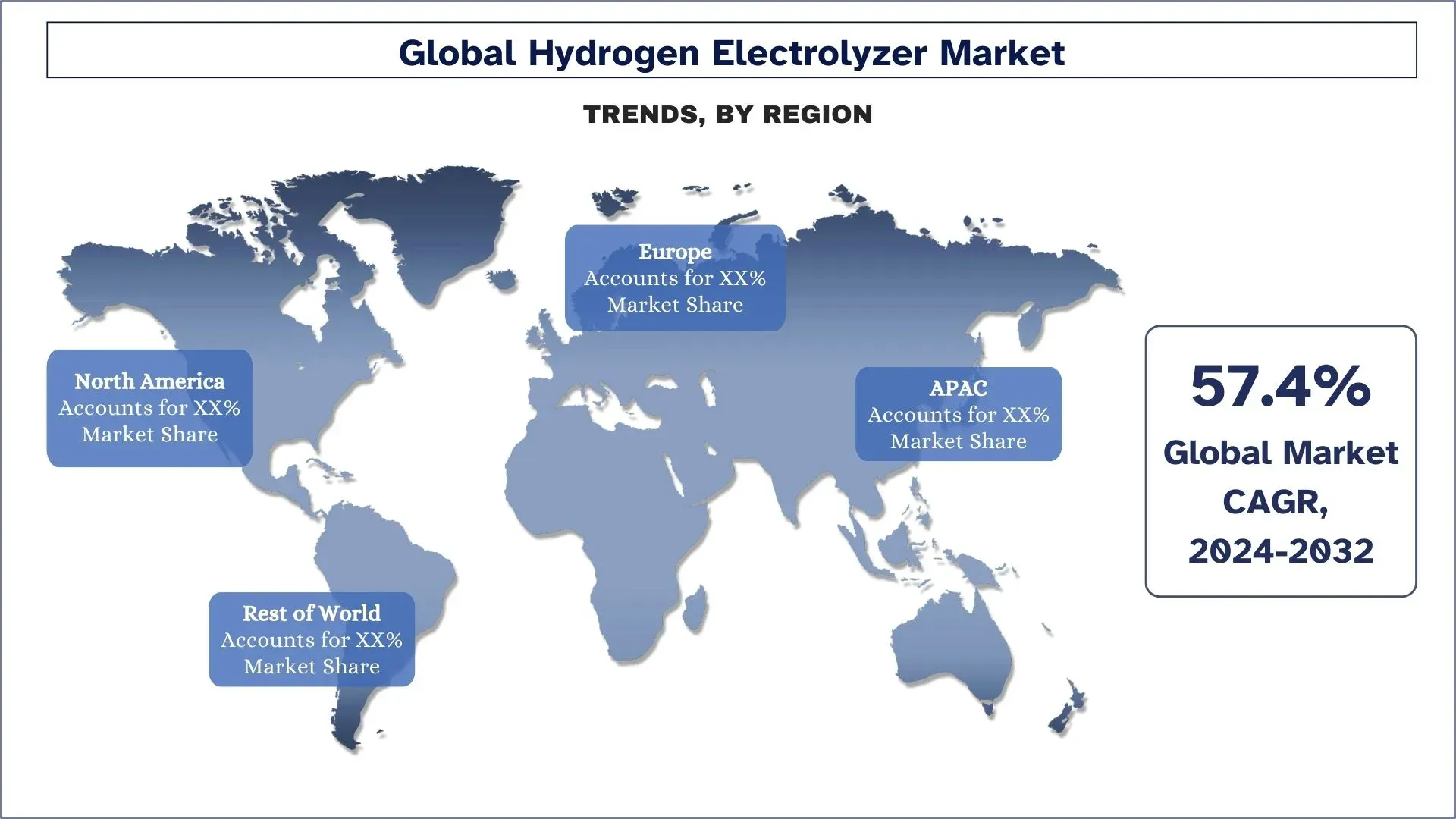
Hydrogen Electrolyzer Industry Overview
The Hydrogen Electrolyzer market is competitive and fragmented, with the presence of several global and international market players. The key players are adopting different growth strategies to enhance their market presence, such as partnerships, agreements, collaborations, new product launches, geographical expansions, and mergers and acquisitions. Some of the major players operating in the market are Green Hydrogen Systems; Giner Inc. (Plug Power Inc); Enapter S.r.l.; MVS Engineering Pvt.; Ltd; Pure Energy Centre; Cummins Inc.; ITM Power plc; McPhy Energy S.A; Nel; H2B2.
Recent Developments in the Hydrogen Electrolyzer Market
In September 2023, Enapter AG revealed plans to enhance its product lineup by introducing the AEM Flex 120, a modular electrolyzer specifically designed to facilitate scalability and streamline the deployment of hydrogen projects for industrial and refueling applications. Enapter AG is a leading provider of scalable hydrogen production solutions, specializing in the development and manufacturing of advanced Anion Exchange Membrane (AEM) electrolyzers.
In June 2023, Air Liquide and Siemens Energy formed a partnership to collaboratively develop, manufacture, and deploy large-scale proton exchange membrane (PEM) electrolyzers to support high-capacity hydrogen production facilities. Air Liquide, a global leader in industrial gases and healthcare solutions, is headquartered in France and operates in over 75 countries, providing innovative technologies for industrial processes, healthcare, and energy transition. Siemens Energy, based in Germany, is a renowned energy technology company focused on advancing sustainable energy systems.
Hydrogen Electrolyzer Market Report Coverage
Report Attribute | Details |
Base year | 2023 |
Forecast period | 2024-2032 |
Growth momentum | Accelerate at a CAGR of 57.4% |
Market size 2023 | USD 817.5 Million |
Regional analysis | North America, Europe, APAC, Rest of the World |
Major contributing region | North America is expected to grow at the highest CAGR during the forecasted period. |
Key countries covered | U.S., Canada, Germany, United Kingdom, Spain, Italy, France, China, Japan, and India |
Companies profiled | Green Hydrogen Systems; Giner Inc. (Plug Power Inc); Enapter S.r.l.; MVS Engineering Pvt.; Ltd; Pure Energy Centre; Cummins Inc.; ITM Power plc; McPhy Energy S.A; Nel; H2B2 |
Report Scope | Market Trends, Drivers, and Restraints; Revenue Estimation and Forecast; Segmentation Analysis; Demand and Supply Side Analysis; Competitive Landscape; Company Profiling |
Segments Covered | By Product; By Capacity; By Application; By Region/Country |
Reasons to buy Hydrogen Electrolyzer Market report:
The study includes market sizing and forecasting analysis validated by authenticated key industry experts.
The report presents a quick review of overall industry performance at a glance.
The report covers an in-depth analysis of prominent industry peers with a primary focus on key business financials, product portfolios, expansion strategies, and recent developments.
Detailed examination of drivers, restraints, key trends, and opportunities prevailing in the industry.
The study comprehensively covers the market across different segments.
Deep dive regional-level analysis of the industry.
Customization Options:
The global hydrogen electrolyzer market can further be customized as per the requirements of any other market segment. Besides this, UnivDatos understands that you may have your own business needs; hence, feel free to contact us to get a report that completely suits your requirements.
Table of Content
Research Methodology for the Hydrogen Electrolyzer Market Analysis (2024-2032)
We analyzed the historical market, estimated the current market, and forecasted the future market of the global Hydrogen Electrolyzer market to assess its application in major regions worldwide. We conducted exhaustive secondary research to gather historical market data and estimate the current market size. To validate these insights, we carefully reviewed numerous findings and assumptions. Additionally, we conducted in-depth primary interviews with industry experts across the Hydrogen Electrolyzer value chain. After validating market figures through these interviews, we used both top-down and bottom-up approaches to forecast the overall market size. We then employed market breakdown and data triangulation methods to estimate and analyze the market size of industry segments and sub-segments.
Market Engineering
We employed data triangulation techniques to finalize the overall market estimation and derive precise statistical numbers for each segment and sub-segment of the global Hydrogen Electrolyzer market. We split the data into several segments and sub-segments by analyzing various parameters and trends, including product, capacity, application, and regions within the global Hydrogen Electrolyzer market.
The main objective of the Global Hydrogen Electrolyzer Market Study
The study identifies current and future trends in the global Hydrogen Electrolyzer market, providing strategic insights for investors. It highlights regional market attractiveness, enabling industry participants to tap into untapped markets and gain a first-mover advantage. Other quantitative goals of the studies include:
Market Size Analysis: Assess the current and forecast market size of the global Hydrogen Electrolyzer market and its segments in terms of value (USD).
Hydrogen Electrolyzer Market Segmentation: Segments in the study include areas of product, capacity, application, and regions.
Regulatory Framework & Value Chain Analysis: Examine the regulatory framework, value chain, customer behavior, and competitive landscape of the Hydrogen Electrolyzer industry.
Regional Analysis: Conduct detailed regional analysis for key areas such as Asia Pacific, Europe, North America, and the Rest of the World.
Company Profiles & Growth Strategies: Company profiles of the Hydrogen Electrolyzer market and the growth strategies adopted by the market players to sustain the fast-growing market.
Frequently Asked Questions FAQs
Q1. What is the current market size and growth potential of the Hydrogen Electrolyzer market?
The global hydrogen electrolyzer market was valued at USD 817.5 million in 2023 and is projected to grow at a CAGR of 57.4% from 2024 to 2032.
Q2. What are the driving factors for the growth of the Hydrogen Electrolyzer market?
Government policies, tax incentives, and subsidies—such as the U.S. Inflation Reduction Act and EU Hydrogen Strategy are accelerating investment in hydrogen electrolyzers. The increasing demand for green hydrogen in power, transportation, and industrial sectors is also boosting market growth.
Q3. Which segment has the largest share of the Hydrogen Electrolyzer market by application?
The power generation market dominates the hydrogen electrolyzer market due to the rising need for renewable energy storage and grid balancing solutions.
Q4. What are the emerging technologies and trends in the Hydrogen Electrolyzer market?
Cutting-edge developments in high-performance catalysts, durable membranes, and AI-powered process optimization are improving electrolyzer efficiency and reducing operational costs. The shift toward modular and scalable electrolyzer systems is making hydrogen production more viable across industries.
Q5. What are the biggest challenges in the Hydrogen Electrolyzer market?
The market faces high capital costs for electrolyzer production and infrastructure development. Advanced electrolyzer technologies, like PEM and solid oxide electrolyzers, require significant investment, creating a barrier to widespread adoption despite government support.
Q6. Which region will dominate the Hydrogen Electrolyzer market?
North America is projected to dominate the market, driven by strong government policies, rising clean energy initiatives, and increasing hydrogen investments in the U.S. and Canada.
Q7. Who are the key players in the Hydrogen Electrolyzer market?
- Green Hydrogen Systems
- Giner Inc. (Plug Power Inc)
- Enapter S.r.l.
- MVS Engineering Pvt. Ltd
- Pure Energy Centre
- Cummins Inc.
- ITM Power plc
- McPhy Energy S.A
- Nel
- H2B2
Q8. What are the key investment opportunities in the hydrogen electrolyzer market?
Key investment areas include large-scale green hydrogen production, next-generation electrolyzer technology, hydrogen storage solutions, and refueling station infrastructure. Government incentives and renewable energy collaborations are further enhancing profitability in this sector.
Q9. How do government policies and incentives impact the adoption of hydrogen electrolyzers?
Supportive policies, including subsidies, tax credits, and funding programs, are accelerating the adoption of hydrogen electrolyzers. Major initiatives like the U.S. Inflation Reduction Act, EU Green Hydrogen Strategy, and China’s Renewable Hydrogen Goals are driving industry-wide expansion.
Related Reports
Customers who bought this item also bought

